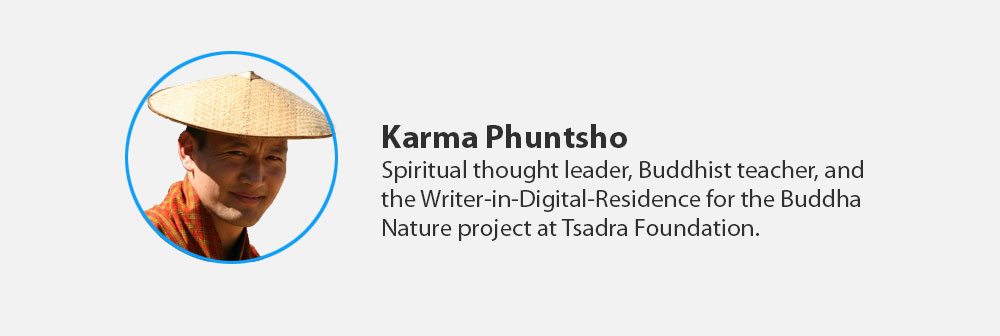Le judre (ལས་རྒྱུ་འབྲས་) or the law of cause and effect is one of the most fundamental concepts in Buddhism. Predating Buddhism, it is a concept shared by other Indian religious traditions including Brahmanism and Jainism. However, the concept of karma in the Buddhist tradition differs from that of other religions or the oft-cited claim that what goes around comes around or every action has an equal reaction. The Buddhists consider the theory of karma to be a vast and abstruse topic (དོན་ཟབ་པ་དང་རྒྱ་ཆེ་བ་) so much so that only the omniscient Buddha can fully fathom it. A great number of Buddhist philosophical treatises deal with the theoretical analysis of karma in depth and detail while Buddhist literature such as the Jātakas also contain stories to illustrate the way karma works.
The moral theory of karma arises as a corollary of the central Buddhist philosophy of tendrel or dependent arising. The philosophy of dependent arising or law of causation asserts that (1) things do not come of nothing but out of causes and conditions, (2) things do not come out of an eternal cause but causes and results are impermanent and subject to change, (3) and that causes and results correspond to each other. It is in the context of this philosophical theory of causation that the Buddhists espouse the moral theory of karma or le judre that all sentient experiences are outcomes of their causal actions committed beforehand. They do not come out of nothing or from an eternal cause such as a creator God but from the positive and negative actions committed in the past. In this respect, all actions, which are ethically charged, lead to resultant existential experiences. Good virtuous actions give rise to pleasant experiences and bad non-virtuous actions bring about unpleasant experiences of suffering. For example, compassion gives rise to peace both in this life and future lifetimes while aggression leads to violence and short life. Neutral actions, like sterile seeds, do not produce results.
Like a single seed giving rise to numerous fruits, the actions do not just lead to an equal outcome but give rise to much greater results. Thus, a single homicide is believed to lead to being killed five hundred times and simple act of giving lead to great wealth in the future. Some ethically charged positive and negative actions are said to definitely bring about results while for others their process of maturation can be thwarted or suppressed by a counteractive force. For example, an action can be overcome through rituals of confession and reparation although what can be expiated differs from one Buddhist school to another. Vajrayāna Buddhist traditions in Bhutan claim that even most heinous actions such as matricide can be expiated through confession and purification. Some actions are said to bring about result in the current lifetime, others in the next or in the subsequent lifetimes.
What is positive or negative and right or wrong in the Buddhist theory of karma is determined by the state of one’s mind. The Buddha taught a voluntaristic theory of karma proclaiming karma to be primarily intention. Speaking against the Brahminical and Jain theories of karma as physical and material phenomena, he declared, “O Monks! Karma, I declare, is intention. Having intended, the body, speech and mind perform action” (Aṅguttaranikāya, iii, 415). It is virtuous, non-virtuous and neutral intentions, which make actions positive, negative and neutral. The three kinds of actions then bring respectively happiness, suffering or no results. An intention is negative when aroused by emotions such as attachment, greed, hatred, ignorance, arrogance and jealousy, and positive when inspired by calm, composed, clear, compassionate and righteous state of the mind.
This moral philosophy of karma with intention/volition at its heart forms the basis of the Buddhist soteriological and ethical system. Karma is not merely an intellectual topic broached by philosophers and scholars but a belief espoused by the devout masses. In Bhutan, le judre is a very popular religious concept used to explain the past and present state of being and also shape the future. It is the foundation of Bhutanese moral conscience, which guides people to good and avoid bad things.


